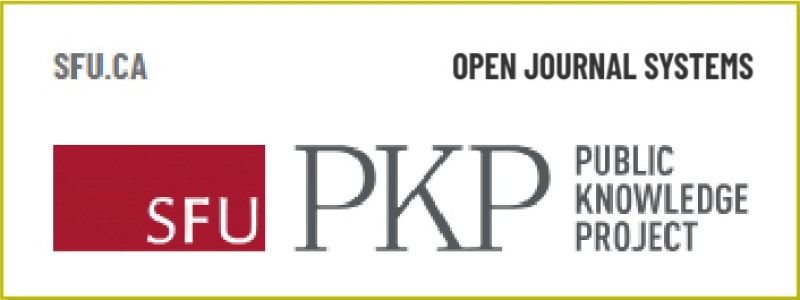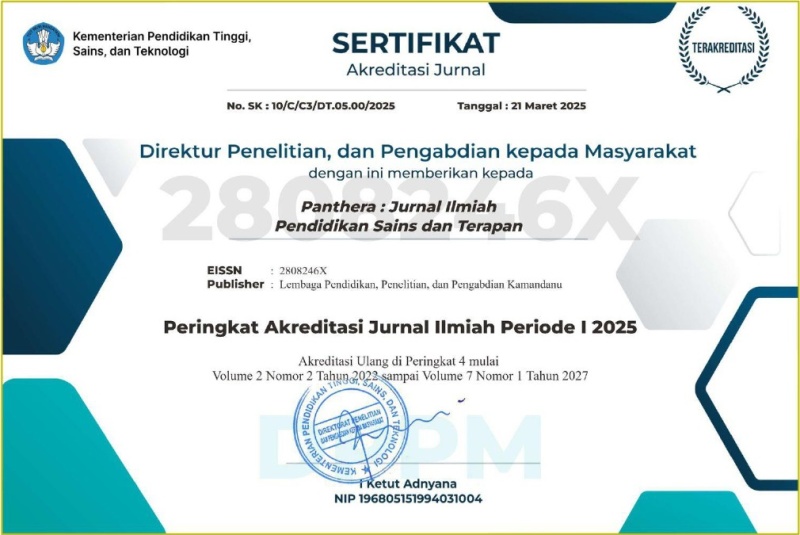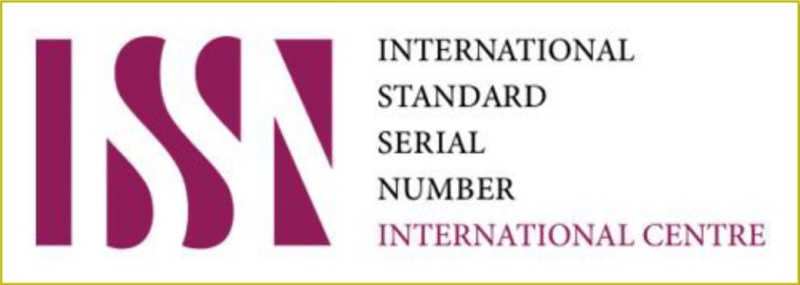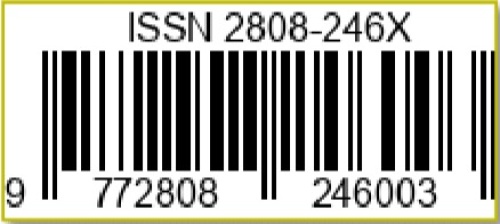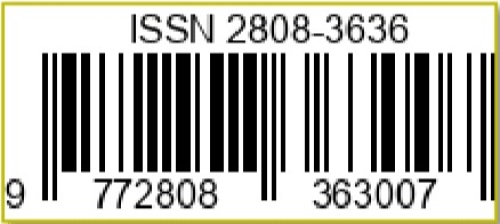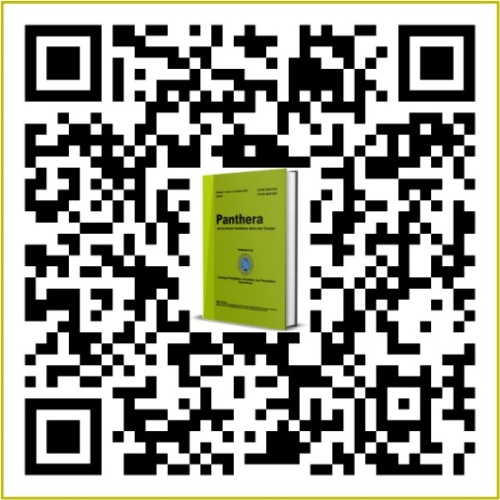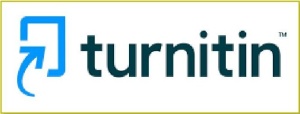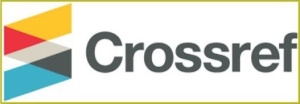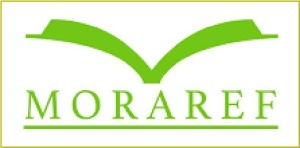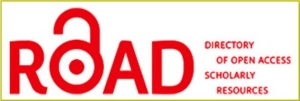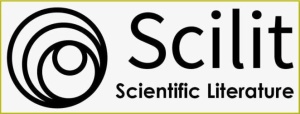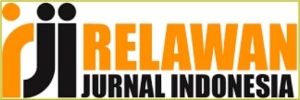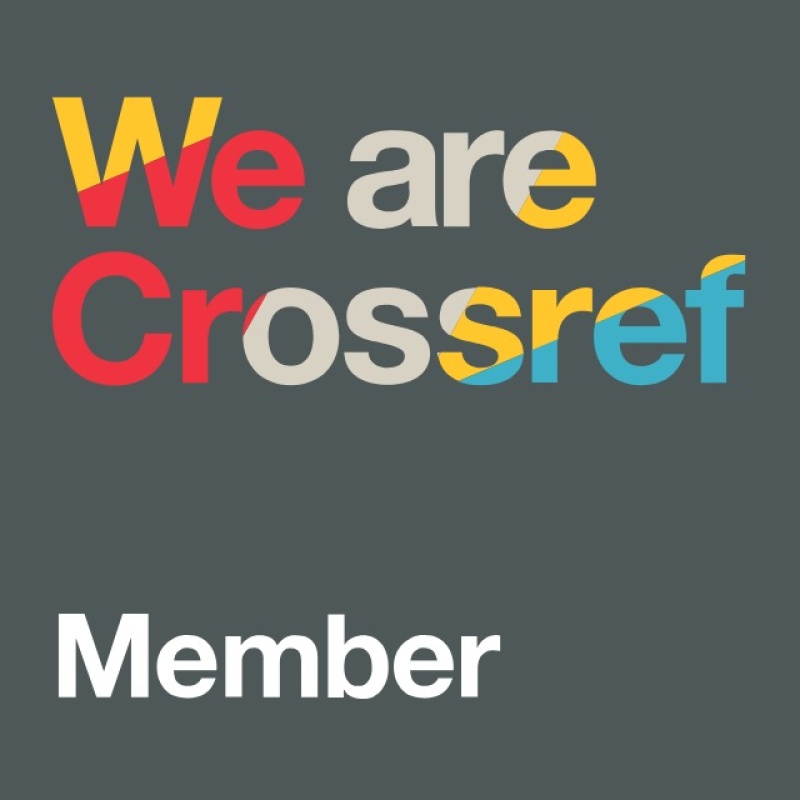Pengembangan E-Modul Berbasis Socio-Scientific Issue (SSI) Terintegrasi HOTS pada Materi Kesetimbangan Kimia
DOI:
https://doi.org/10.36312/panthera.v5i4.683Keywords:
E-Module, HOTS, Chemical Equilibrium, Development, Socio-Scientific IssueAbstract
The low learning outcomes of students in chemistry subjects are caused by teachers still not implementing the existing learning model, the teaching materials used are still sourced from schools and there are no interactive teaching modules that are considered quite practical in learning activities. The questions used during the evaluation are still dominant in the LOTS type in the 21st century learning era which emphasizes learning with a Higher Level Thinking style (HOTS). To address this problem, this study aims to develop a valid HOTS-integrated socio-scientific issue (SSI) based e-module on chemical equilibrium material. This research uses the Research and Development (R&D) method with a 4D development model from Thiagaranjan which is limited to the 3D stage, namely Define, Design, and Develop. The subjects in this study are 3 lecturers and 2 teachers as validators of material and media experts. The object of this research is an SSI-HOTS-based e-module on chemical equilibrium material. The instruments used, namely non-test instruments, include student needs analysis questionnaires, interview sheets and material and media expert validation questionnaires. The results of the validation of SSI-HOTS-based e-modules on chemical equilibrium materials were declared very valid, with the average percentage of the score of the assessment results of the material expert validator of 91.67% and the average percentage of the score of the assessment results of the media expert validator of 90%. Thus, this e-module has the potential to be an innovative teaching material alternative that is practical and supports the improvement of students' understanding of the concept of chemical equilibrium and higher-level thinking skills.
Downloads
References
Aliyyah, S. R., Pangesthi, L. T., Dewi, I. H. P., & Handajani, S. (2025). Pengembangan E-Modul Berbasis Flipbook Materi Pertolongan Pertama pada Kecelakaan Kerja (P3K) untuk Siswa SMK Kuliner. Jurnal Ilmiah Profesi Pendidikan, 10(1), 232-238. https://doi.org/10.29303/jipp.v10i1.2903
Amdayani, S., Dibyantini, R., Darmana, A., & Dalimunthe, M. (2022). Development of Socio-Scientific Issues Based Reaction Rate Module and Science Literacy Oriented. In Proceedings of the 4th International Conference on Innovation in Education, Science and Culture (pp. 1028-1033). Medan, Indonesia: Program Studi Pendidikan Kimia, Universitas Negeri Medan.
Antonius, A., Huda, N., & Suratno, S. (2022). Pengembangan E-Modul Interaktif Pembelajaran Gambar Teknik Berbasis Keterampilan Kreatif untuk Siswa SMK. Jurnal Manajemen Pendidikan dan Ilmu Sosial, 3(2), 1090-1102. https://doi.org/10.38035/jmpis.v3i2.1347
Arikunto, S. (2010). Prosedur Penelitian suatu Pendekatan Praktek. Jakarta: PT. Rineka Cipta.
Asropah, A., Septiana, I., & Ripai, A. (2021). Miskonsepsi Guru pada Pemahaman Materi Bahasa Indonesia Pokok Bahasan Kalimat. Jurnal Pendidikan Bahasa, 10(2), 106-117. https://doi.org/10.31571/bahasa.v10i2.2739
Budi, F. W. S. (2025). Meningkatkan Motivasi Belajar Siswa melalui Materi yang Dekat dengan Kehidupan. In Prosiding Seminar Psikologi (PROSEPSI) (pp. 1-13). Kudus, Indonesia: Fakultas Psikologi, Universitas Muria Kudus.
Firanti, F. F., Erviyenni, E., & Erna, M. (2024). Uji Kelayakan E-Modul Asam Basa Berbasis SSI (Socio-Scientific Issues) Berbantuan Flip PDF Professional. Jurnal Pendidikan Kimia Undiksha, 7(1), 20-28. https://doi.org/10.23887/jjpk.v8i1.70540
Fitria, Y., Safnowandi, S., & Fajri, S. R. (2022). Pengaruh Model Pembelajaran Inkuiri Terbimbing (Guided Inquiry) Berbasis Saintifik terhadap Kemampuan Berpikir Kritis Siswa. Biocaster : Jurnal Kajian Biologi, 2(3), 128-141. https://doi.org/10.36312/bjkb.v2i3.97
Freani, R. D. (2024). Model Radec Berbasis Socio-Scientific Issue (SSI) sebagai Alternatif Meningkatkan Higher Order Thinking Skills pada Pembelajaran IPA Abad 21. In Proceeding Seminar Nasional IPA (pp. 265-272). Semarang, Indonesia: Program Studi Pendidikan IPA, Universitas Negeri Semarang.
Gufran, G., Ruslan, R., & Ilham, I. (2025). Pengaruh Pembelajaran Berbasis Higher Order Thinking Skills (HOTS) terhadap Kemampuan Berfikir Kritis Siswa II SD Julasfi Warraihan. Jurnal Pendidikan dan Pembelajaran Indonesia, 5(3), 1394-1400. https://doi.org/10.53299/jppi.v5i3.1960
Heny, S. D. N. K., Suwindra, I. N. P., & Mardana, I. B. P. (2018). Strategi Pembelajaran Guru: Relevansinya dalam Mereduksi Miskonsepsi dan Peningkatan Prestasi Belajar Siswa. Jurnal Pendidikan Fisika Undiksha, 8(1), 21-30. https://doi.org/10.23887/jjpf.v8i1.20247
Kurniawan, C., & Kuswandi, D. (2021). Pengembangan E-Modul sebagai Media Literasi Digital pada Pembelajaran Abad 21. Lamongan: Academia Publication.
Ndruru, F. P. S., & Amdayani, S. (2023). Development of E-Modules Based on Socio-Scientific Issues on Chemistry Content. Jurnal Inovasi dan Teknologi Pembelajaran, 10(2), 129-140. https://doi.org/10.17977/um031v10i22023p129
Permatasari, M. B., Muchson, M., Hakimah, N., Rokhim, D. A., Herunata, H., & Yahmin, M. (2022). Identifikasi Miskonsepsi Materi Kesetimbangan Kimia pada Siswa SMA Menggunakan Tes Three Tier Berbasis Web. Jurnal Inovasi Pendidikan Kimia, 16(1), 1-7. https://doi.org/10.15294/jipk.v16i1.29407
Priyanka, L. M., & Selamat, I. N. (2021). Socio-Scientific Issue Based Instruction pada Mata Kuliah Ilmu Lingkungan. Jurnal Pendidikan dan Pembelajaran IPA Indonesia, 11(1), 29-36. https://doi.org/10.23887/jppii.v11i1.60846
Putri, N. Q., & Haikal, M. (2023). Pengembangan dan Validasi Modul Pembelajaran Berbasis Problem-Based Learning pada Materi Keanekaragaman Hayati untuk Siswa Madrasah Aliyah. Journal of Authentic Research, 2(1), 26-38. https://doi.org/10.36312/jar.v2i1.1476
Rahayu, S. (2019). Socioscientific Issues: Manfaatnya dalam Meningkatkan Pemahaman Konsep Sains, Nature of Science (NoS) dan Higher Order Thinking Skills (HOTS). In Seminar Nasional Pendidikan IPA UNESA (pp. 1-14). Surabaya, Indonesia: Program Studi Pendidikan IPA, Universitas Negeri Surabaya.
Rizkiyani, S., Wahyudi, W., & Verawati, N. N. S. P. (2024). Validitas E-Modul Interaktif Berbasis Model Pembelajaran Inkuiri Terbimbing pada Materi Gelombang Bunyi. Jurnal Ilmiah Profesi Pendidikan, 9(2), 1458-1464. https://doi.org/10.29303/jipp.v9i2.2385
Sholeha, D. F., Kusasi, M., & Bakti, I. (2023). Pengembangan Instrumen Soal Higher-Order Thinking Skills (HOTS) Berbasis Google Form untuk Mengukur Hasil Belajar Peserta Didik pada Materi Hidrolisis Garam. Journal of Chemistry and Education, 7(1), 32-48. https://doi.org/10.20527/jcae.v7i1.2548
Suyatno, S., Juharni, J., & Susilowati, S. (2023). Teori Belajar & Pembelajaran Berorientasi Higher Order Thinking Skills. Yogyakarta: K-Media.
Thiagarajan, S., Semmel, D. S., & Semmel, M. I. (1974). Instructional Development for Training Teachers of Exceptional Children: A Sourcebook. Bloomington: Indiana University.
Downloads
Published
How to Cite
Issue
Section
License
Copyright (c) 2025 Putri Theresia Ambarita & Makharany Dalimunthe

This work is licensed under a Creative Commons Attribution-ShareAlike 4.0 International License.
-
Attribution — You must give appropriate credit, provide a link to the license, and indicate if changes were made. You may do so in any reasonable manner, but not in any way that suggests the licensor endorses you or your use.
-
ShareAlike — If you remix, transform, or build upon the material, you must distribute your contributions under the same license as the original.


